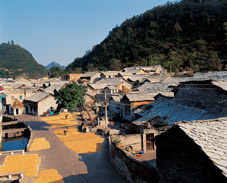
Ancient castles are generally associated with medieval Europe. But castle complexes dating to the 14th century also exist in China's southwestern Guizhou Province. Today, more than 5,000 people in 1,250 households live in a kingdom of stone: cobbled roads, stone walls, stone houses, stone grinds, stone rollers, stone jars, stone gates, and stone watchtowers.
To visit them, set out from Guiyang, the capital of Guizhou, and drive 72 kilometers westward along the road leading to the Huangguoshu Scenic Area. Viewed
from afar, stone-structured villages, known as "Tunpu," look like white islets dotting vast, green fields. As you come closer, you will find women laboring in the fields, wearing broad-sleeved robes, crepe scarves, silver hairpins, silk waist belts, and other colorful ornaments. They may easily be mistaken as ethnic minorities. In fact, they are Han people, the ethnic majority of China today, although these Han, the Tunpu, maintain customs from the Ming Dynasty (1368-1644).
The ancestors of the Tunpu were troops of the Ming court stationed here some 600 years ago, and came from the middle and lower reaches of the Changjiang (Yangtze) River.
The ancient town of Tianlong Tunpu, in Guizhou's Pingba County, was once an important passage to Yunnan Province, occupying a strategic position. So the Ming emperors stationed troops for both defense and land reclamation. In order to resist enemy invasion, the troops gave top construction priority to defense. At the time, stone was the toughest material readily available.
In Tunpu stone castles, there is a clear division of labor between men and women. Men earn money away from the home, while women stay put, farming and doing chores. For men in Tunpu, another important aspect of life is the performance of Di Opera, a local art form originating from a military ceremony for bolstering morale and driving away enemies.
The Tunpu people believe in multiple gods. They worship shrines at home and hold religious rituals every month. To help cope with the changes they faced after being assigned to Guizhou, the ancestors of the Tunpu people became more and more devoted to these gods.
They brought along various gods they worshipped at home in Buddhism, Taoism, and Confucianism and constructed many temples in the villages and on the mountains. The Wulong Monastery on Tiantai Mountain two kilometers east of town is well known for its brilliant blend of military defense and religious architecture.
While keeping the typical cuisine of the middle and lower reaches of the Changjiang River, the Tunpu people also changed their food habits to meet wartime requirements and to accustom themselves to the isolated environment. Dried, fermented food that was easily taken to battle and could last for a long period was common in the past and is still popular on the table today: dried tofu, dried beans, preserved meat, cured sausage, pickled vegetables, and marinated hot peppers in fermented glutinous wine.
The Tunpu people are very hospitable. Whenever they see visitors passing by their homes, they call them in and entertain them with a cup of homemade tea, and all of the town's streets and households are tidy.
There are many other castle towns like Tianlong Tunpu in the western part of Guizhou. Over hundreds of years, the castle-dwellers have strictly maintained their traditional customs. Of course, modern civilization has also found its way into the towns. It's not surprising these days to find the local people using radios, TV sets and even mobile phones, even in the land of stone.
Tour packages:
One-day Tour:
Morning: watch Di Opera and go on a sightseeing tour of the ancient town (ancient streets and lanes, residential houses, watchtowers, post roads, and school sites).
Afternoon: visit Tiantai Mountain to enjoy the scenery, the ancient city wall, and the architecture of the Wulong Monastery.
Two-day Tour:
Day 1: visit the ancient town of Tunpu and the farmers living there. In the evening listen to folk songs and Buddhist songs sung by local villagers, savor local tea, and dine at a farmer's house.
Accommodation: a guesthouse at the foot of Tiantai Mountain (15-20 yuan per person).
Day 2: visit Tiantai Mountain.
Three-day Tour:
Days 1-2: visit the ancient town of Tunpu as well as Yunshantun and Benzhai Villages. Enjoy folk operas at night.
Day 3: visit Tiantai Mountain.
Travel tips:
A. Tianlong Tunpu Ancient Town is 72 kilometers from Guiyang. Visitors setting off from Guiyang can take a westbound bus to the Huangguoshu Scenic Area. Get off at the gas station at Tianlong Crossing. Then walk southward along the Guizhou-Yunnan Highway for 1.5 kilometers, and you will encounter the town. You can also take a bus from Guiyang to Anshun (every 10-15 minutes; ticket: 12 yuan) at Guiyang Passenger Station or at the New Gymnasium Station and get off at Tianlong Gas Station.
B. Ticket to Tianlong Tunpu Ancient Town: 20 yuan
(China Pictorial November 18, 2003)
|

